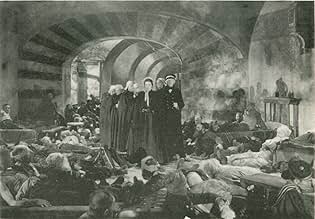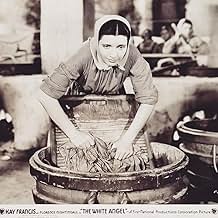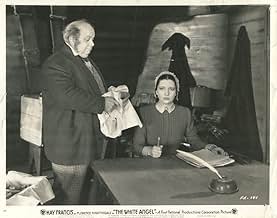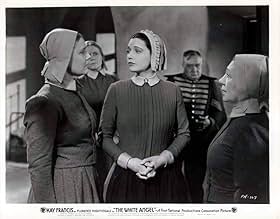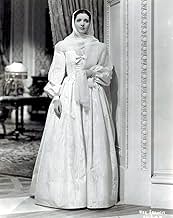IMDb RATING
6.6/10
443
YOUR RATING
A look at the life of Florence Nightingale.A look at the life of Florence Nightingale.A look at the life of Florence Nightingale.
- Awards
- 2 wins & 1 nomination total
Lillian Kemble-Cooper
- Parthenope 'Parthe' Nightingale
- (as Lillian Cooper)
Featured reviews
William Dieterle, like so many of his contemporaries, left Germany in the 1930's and headed for Tinseltown. He proved himself very adaptable and whilst under contract to Warner Brothers, raised that studio's prestige by directing a series of well-mounted biopics. Invariably set in foreign climes these studio-bound films were all totally convincing in terms of period and place.
This biopic of Florence Nightingale is no exception and although considered the weakest of them all, not least by Dieterle himself, it remains a convincing portrait of Victorian England with its squalor and class-ridden complacency regarding the plight of the lower orders and the general view that nursing was little better than prostitution. It is no less effective when switching to the Crimea and the horrendous conditions that prevailed in the soldiers' hospital at Scutari.
Historically of course it is Hollywood Hokum and full of inaccuracies but it succeeds in its purpose of depicting a truly extraordinary woman and her battle with institutionalised ignorance and prejudice.
Dieterle's customary visual sense is complemented by two stalwarts of Warner Bros, cinematographer Tony Gaudio and the brilliant head of Art Direction, Polish émigré, Anton Grot.
It is generally agreed that the weak link lies in the casting of Kay Francis as Florence. She was at the time Queen of the Lot at Warner Bros and its highest paid star. This, coupled with her innate classiness would make her the obvious choice. She is certainly not lacking in sincerity and it is not her fault that her part has been written more as a symbol than as flesh and blood which alas makes the character rather one-dimensional. Ian Hunter does his best with another one-dimensional role as a reporter for 'The Times' and Donald Crisp excels as the odious Dr. Hunt.
Whatever its shortcomings this version is infinitely more powerful and engaging than that of Herbert Wilcox in 1950 which is little more than a series of tableaux-vivants.
Suffice to say that since her death Miss Nightingale's achievements and far-reaching influence have been overshadowed by suggestions of misogyny, lesbianism and racism! She remains however a Feminist icon despite her observation that although they might crave sympathy "women have no sympathy and my experience of women is almost as large as Europe."
This biopic of Florence Nightingale is no exception and although considered the weakest of them all, not least by Dieterle himself, it remains a convincing portrait of Victorian England with its squalor and class-ridden complacency regarding the plight of the lower orders and the general view that nursing was little better than prostitution. It is no less effective when switching to the Crimea and the horrendous conditions that prevailed in the soldiers' hospital at Scutari.
Historically of course it is Hollywood Hokum and full of inaccuracies but it succeeds in its purpose of depicting a truly extraordinary woman and her battle with institutionalised ignorance and prejudice.
Dieterle's customary visual sense is complemented by two stalwarts of Warner Bros, cinematographer Tony Gaudio and the brilliant head of Art Direction, Polish émigré, Anton Grot.
It is generally agreed that the weak link lies in the casting of Kay Francis as Florence. She was at the time Queen of the Lot at Warner Bros and its highest paid star. This, coupled with her innate classiness would make her the obvious choice. She is certainly not lacking in sincerity and it is not her fault that her part has been written more as a symbol than as flesh and blood which alas makes the character rather one-dimensional. Ian Hunter does his best with another one-dimensional role as a reporter for 'The Times' and Donald Crisp excels as the odious Dr. Hunt.
Whatever its shortcomings this version is infinitely more powerful and engaging than that of Herbert Wilcox in 1950 which is little more than a series of tableaux-vivants.
Suffice to say that since her death Miss Nightingale's achievements and far-reaching influence have been overshadowed by suggestions of misogyny, lesbianism and racism! She remains however a Feminist icon despite her observation that although they might crave sympathy "women have no sympathy and my experience of women is almost as large as Europe."
Kay Francis stars in this biopic of Florence Nightingale. I love old Hollywood biopics. They get a lot of flack today by certain types for embellishing some facts of these people's lives. Seems to me biopics today have even worse flaws. Instead of embellishing positively they embellish negatively. In other words, instead of focusing on inspiring uplifting strengths and virtues they focus on the faults and vices of historical figures. To each their own but personally I will take the rousing biographical films from back then over the salacious and often slanderous ones of the modern era.
Rant aside, this is not the strongest biopic but it is a decent one. Kay Francis works against type quite well. She's helped by an amazing supporting cast. To name a few: Donald Crisp, Nigel Bruce, Donald Woods, Henry O'Neill, Ian Hunter, Halliwell Hobbes -- they all give first rate support.
Overall it's an entertaining film. I recommend it to people who are interested In the story of Florence Nightingale and anybody who enjoys Golden Age of Hollywood biographical dramas.
Rant aside, this is not the strongest biopic but it is a decent one. Kay Francis works against type quite well. She's helped by an amazing supporting cast. To name a few: Donald Crisp, Nigel Bruce, Donald Woods, Henry O'Neill, Ian Hunter, Halliwell Hobbes -- they all give first rate support.
Overall it's an entertaining film. I recommend it to people who are interested In the story of Florence Nightingale and anybody who enjoys Golden Age of Hollywood biographical dramas.
In the grand tradition of biography pictures that sanctify their subjects comes "The White Angel," the "true" story of the lady with the lamp, the nurse who revolutionized nursing, Miss Florence Nightingale. Why does Hollywood insist on sanitizing and sweetening the lives of real people? The most blatant example of this is probably "Private Parts"- the life story of Howard Stern- which turns America's favorite sexually-stunted shock-jock bully into a misunderstood merry prankster, a teddy bear of a man fighting the good fight against prudes and censors. Right.
I caught "The White Angel" on TCM late one evening. It begins with Florence Nightingale- "Flo" to her contemporaries- rejecting tradition and refusing to marry and settle down. She senses a greater purpose and a place for women in military medicine. [In actuality Florence and her sister were encouraged to pursue education by their forward-thinking father.] As played by Kay Francis, Ms. Nightingale is a humorless, passionless saint with absolute confidence in her methods and philosophy. Kay plays the role as if she's riding a heroin high- deeply centered and somewhat removed. With the success of the film riding on this lead performance, we're left with a fascinatingly anti-climactic picture.
There is little if any dramatic conflict in the film- it has all the suspense of a book report. The encounters between Florence and other characters are all laughably wooden. Her antagonists openly profess their resentment of her to her face and she sits stoic, with eyes-wide, accepting the abuse and calmly declaring her intentions to proceed. In one particularly action-less sequence, Florence and her nurses storm the supply tent after the clerk tells them it's closed. "Does the war close at seven?" Florence asks, "Do they stop bringing in the wounded at seven?"
Before the bureaucrat gets the chance to answer, Florence has delicately and glamorously stepped past him, forcing her way inside with the help of the other nurses.
That's the most exciting moment in the movie.
Henry Wadsworth Longfellow stops by to gawk at her heroism and write the poem that would immortalize her. Crusty wounded soldiers smile at her tenderness as she walks the hospital halls at night checking on her patients. I had trouble keeping mine.
The story seems SO glossed-over and tidy (even for a biopic of the 30's) that one can't help but feel cheated by fabricated elements as well as the absence of significant actual events. When Florence arrives at the military hospital a soldier informs her that 57% of all wounded men die even under medical care... the trouble is we're never given an updated number as to a soldier's chance of survival. This is especially ironic due to the fact that a)Florence's Nightingale's arrival and improvement of the military medical system surely improved the survival rate and b) Nightingale herself was famous for her statistical analysis and record-keeping of mortality rates and other social phenomenas. Disappointing.
The film is ultimately a waste; it is predictable and pre-digested, not even diverting enough to hold my attention. Who knew changing the world could be so boring?
Grade: C
I caught "The White Angel" on TCM late one evening. It begins with Florence Nightingale- "Flo" to her contemporaries- rejecting tradition and refusing to marry and settle down. She senses a greater purpose and a place for women in military medicine. [In actuality Florence and her sister were encouraged to pursue education by their forward-thinking father.] As played by Kay Francis, Ms. Nightingale is a humorless, passionless saint with absolute confidence in her methods and philosophy. Kay plays the role as if she's riding a heroin high- deeply centered and somewhat removed. With the success of the film riding on this lead performance, we're left with a fascinatingly anti-climactic picture.
There is little if any dramatic conflict in the film- it has all the suspense of a book report. The encounters between Florence and other characters are all laughably wooden. Her antagonists openly profess their resentment of her to her face and she sits stoic, with eyes-wide, accepting the abuse and calmly declaring her intentions to proceed. In one particularly action-less sequence, Florence and her nurses storm the supply tent after the clerk tells them it's closed. "Does the war close at seven?" Florence asks, "Do they stop bringing in the wounded at seven?"
Before the bureaucrat gets the chance to answer, Florence has delicately and glamorously stepped past him, forcing her way inside with the help of the other nurses.
That's the most exciting moment in the movie.
Henry Wadsworth Longfellow stops by to gawk at her heroism and write the poem that would immortalize her. Crusty wounded soldiers smile at her tenderness as she walks the hospital halls at night checking on her patients. I had trouble keeping mine.
The story seems SO glossed-over and tidy (even for a biopic of the 30's) that one can't help but feel cheated by fabricated elements as well as the absence of significant actual events. When Florence arrives at the military hospital a soldier informs her that 57% of all wounded men die even under medical care... the trouble is we're never given an updated number as to a soldier's chance of survival. This is especially ironic due to the fact that a)Florence's Nightingale's arrival and improvement of the military medical system surely improved the survival rate and b) Nightingale herself was famous for her statistical analysis and record-keeping of mortality rates and other social phenomenas. Disappointing.
The film is ultimately a waste; it is predictable and pre-digested, not even diverting enough to hold my attention. Who knew changing the world could be so boring?
Grade: C
Kay Francis was cast as Florence Nightingale and the film shows Florence from the time just before she dedicated her life to nursing to just after her return from the Crimean War. Francis' acting and that of most of the supporting actors was good--the dialog and details left a bit to be desired.
Hollywood sure loved bio-pics in the 30s and 40s and churned out gobs of them. The problem, though, is that while many were very entertaining, they also played rather fast and loose with the facts as well as had very, very high "schmaltz" levels on many occasions. In other words, the celebrities being portrayed were very often over-idealized and seemed more like living saints than 3-dimensional heroes. While Florence Nightingale was an absolutely amazing woman and deserved to have a film made about her, all too often the film degenerated into idol worship. My favorite over-the-top moment was when Flo entered the dilapidated hospital and the man ran screaming "water!!!"--what an amazingly unsubtle moment! While the general facts in the film are correct, the way they were realized on screen, at times, made me laugh. This is really a shame, as the real story of this woman should be good enough! As for me, I'd like to see a more realistic and less predictable treatment of her long life.
Hollywood sure loved bio-pics in the 30s and 40s and churned out gobs of them. The problem, though, is that while many were very entertaining, they also played rather fast and loose with the facts as well as had very, very high "schmaltz" levels on many occasions. In other words, the celebrities being portrayed were very often over-idealized and seemed more like living saints than 3-dimensional heroes. While Florence Nightingale was an absolutely amazing woman and deserved to have a film made about her, all too often the film degenerated into idol worship. My favorite over-the-top moment was when Flo entered the dilapidated hospital and the man ran screaming "water!!!"--what an amazingly unsubtle moment! While the general facts in the film are correct, the way they were realized on screen, at times, made me laugh. This is really a shame, as the real story of this woman should be good enough! As for me, I'd like to see a more realistic and less predictable treatment of her long life.
I come from a family of nurses, so I watched this film with interest.
Kay Francis plays Florence Nightingale, the founder of modern nursing. Mostly the film covers her work in the Crimea.
This is a typical '30s movie - Nightingale meets with a great deal of resistance, which she probably did in real life. The villains here are somewhat cliched in their nastiness and refusal to help her make any progress. A typical good vs. Evil fight.
I read a lot of criticism about Kay Francis - this was an unusual role for her, where she's not playing a woman of the world. I thought she portrayed a quiet strength and dignity.
Someone said Bette Davis would have been better. Bette Davis was wonderful, but I didn't feel Nightingale needed a fiery portrayal. As far as criticism of Francis, Francis' interpretation was correct in that she was well-educated and came from a wealthy family.
Granted she's portrayed as a saint, but that's the fault of the script. I do believe that Nightingale, given her upbringing, was a strong and determined woman who used a velvet glove rather than an iron hand.
I found the film very absorbing and poignant.
Kay Francis plays Florence Nightingale, the founder of modern nursing. Mostly the film covers her work in the Crimea.
This is a typical '30s movie - Nightingale meets with a great deal of resistance, which she probably did in real life. The villains here are somewhat cliched in their nastiness and refusal to help her make any progress. A typical good vs. Evil fight.
I read a lot of criticism about Kay Francis - this was an unusual role for her, where she's not playing a woman of the world. I thought she portrayed a quiet strength and dignity.
Someone said Bette Davis would have been better. Bette Davis was wonderful, but I didn't feel Nightingale needed a fiery portrayal. As far as criticism of Francis, Francis' interpretation was correct in that she was well-educated and came from a wealthy family.
Granted she's portrayed as a saint, but that's the fault of the script. I do believe that Nightingale, given her upbringing, was a strong and determined woman who used a velvet glove rather than an iron hand.
I found the film very absorbing and poignant.
Did you know
- TriviaMuch disagreement to the origin of the source material exists. Some contemporary sources believed the source was Lytton Strachey's 1918 biographical essay in "Eminent Victorians". Others contend Michael Jacoby was the author. Warner Bros. executive Hal B. Wallis contended that the life of Florence Nightingale was in the public domain, and that screenwriter Mordaunt Shairp did his own research. The MPAA agreed with Wallis; no source credit was necessary.
- GoofsWhen Florence is receiving the news on the steps of the hospital of the sinking of the French transport, the shadow of the boom microphone moves onto then quickly off her left sleeve.
- Crazy creditsPrologue: Towards the year 1850, England was at peace with the world. Her men were following her ships to the four corners of the earth, building the great empire that is Queen Victoria's monument. Women were only permitted to nod meek approval. In all England, only Her Majesty had the right to express herself with the independence of a man.
- ConnectionsFeatured in Breakdowns of 1936 (1936)
- SoundtracksAuld Lang Syne
(uncredited)
Traditional
Lyrics by Robert Burns
Incorporated into the score at the new year
Sung by the crowd celebrating the new year
Details
- Release date
- Country of origin
- Language
- Also known as
- The White Angel
- Filming locations
- Production companies
- See more company credits at IMDbPro
- Runtime
- 1h 32m(92 min)
- Color
- Sound mix
- Aspect ratio
- 1.37 : 1
Contribute to this page
Suggest an edit or add missing content



